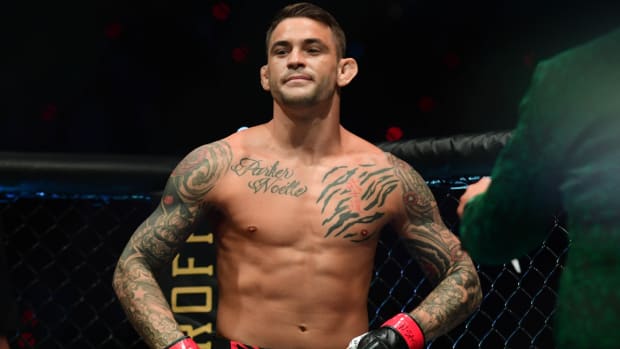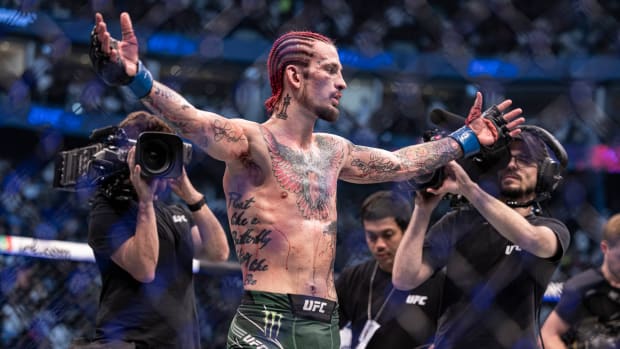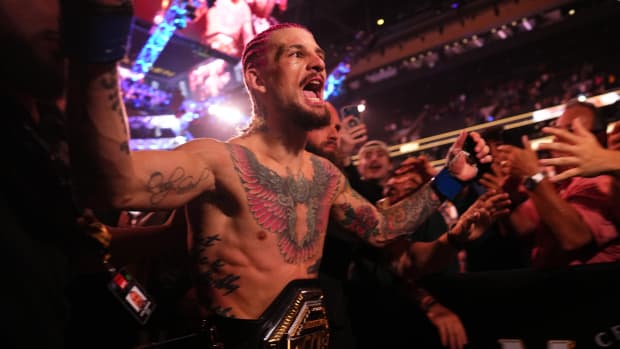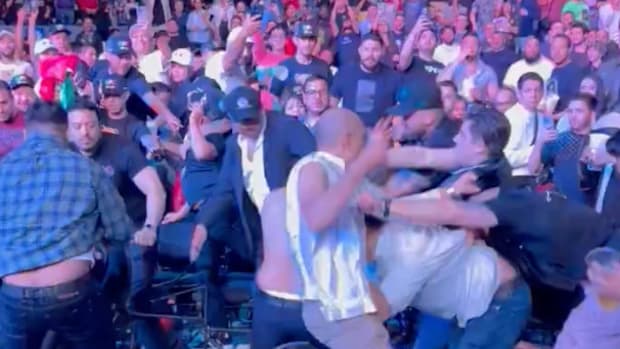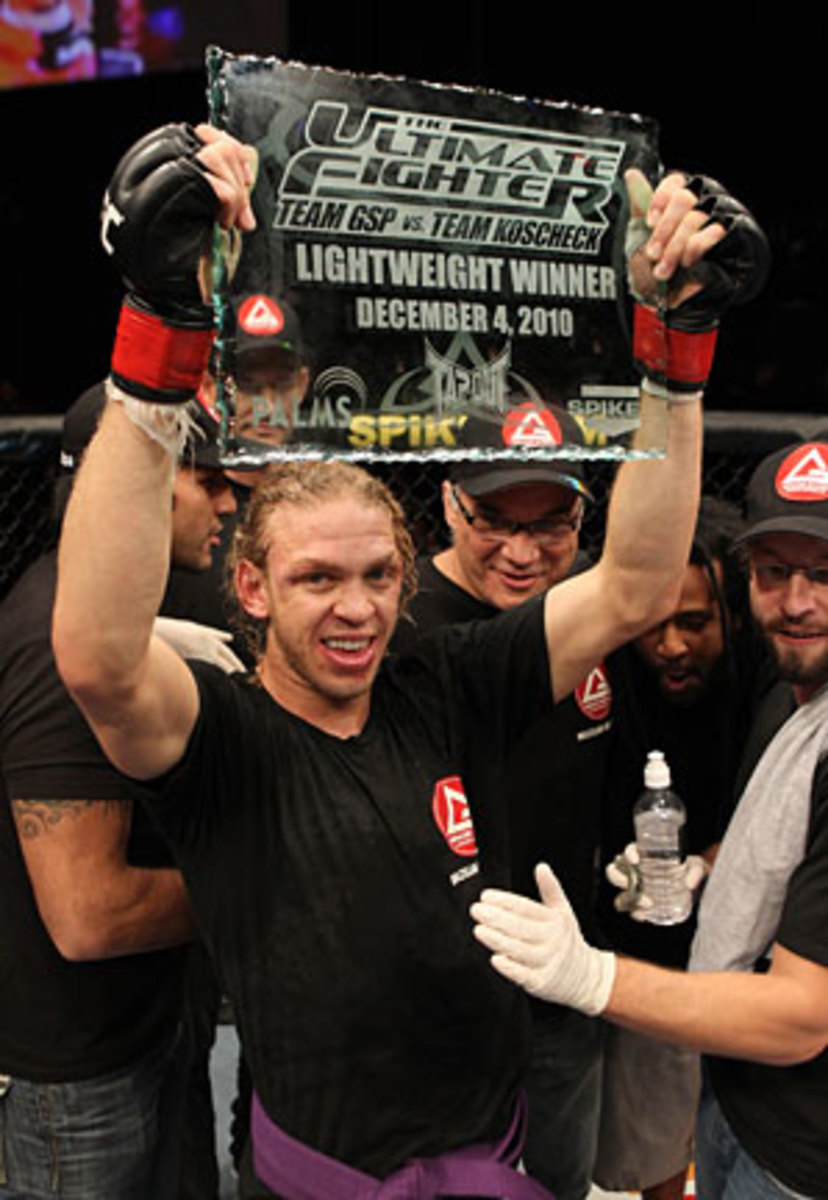
TUF winner Brookins might not be instant star, but give him time
As reality television goes, The Ultimate Fighter is a pretty solid springboard toward fame and fortune. If not fortune, at least a career that lasts beyond the typical 15 minutes of vapid celebrity on a fast track toward a train wreck.
Jonathan Brookins, who on Saturday night became the Season 12 winner of the UFC's tournament for up-and-comers by winning a unanimous decision over Michael Johnson in Las Vegas, doesn't seem like the kind of guy who sits on the couch with a buttery vat of popcorn watching something that barely resembles real life unfold on Survivor, The Bachelor or even the old Joe Rogan-hosted Fear Factor. Portrayed on the weekly Spike show as reflective, focused, even spiritual, he's the type who likely will keep his eyes on the prize. And there is a prize to be had, if a fighter is persistent and patient.
Ah, patience. The last several TUF seasons have yet to produce a star, the closest maybe being Season 10 finalists Roy Nelson and Brendan Shaub, who've had some shimmering moments in the UFC. So, for that matter, has Matt Mitrione, who lost in the semifinals. Season 10 also featured Kimbo Slice, who came in already famous but saw his star dim.
For real star power, you have to go back to the first season, in 2005, which featured competition between both middleweights and light heavyweights. Several fighters from that season have gone on to stellar, lasting careers, not just the two winners (Forrest Griffin, Diego Sanchez) but also the runners-up (Stephan Bonnar, Kenny Florian) as well as a few others (Josh Koscheck, Chris Leben, Mike Swick). Three years after the show, Griffin became a UFC champion, beating Quinton "Rampage" Jackson for the light heavyweight belt. Koscheck fights for George St-Pierre's welterweight title next Saturday.
Two other TUF guys went on to be champions as well: Matt Serra (Season 4) upset St-Pierre to end his first welterweight reign in '07, and Rashad Evans (Season 2) beat Griffin for the 205-pound title in 2008. Gray Maynard (Season 5) challenges Frankie Edgar for the lightweight title on New Year's night.
So please excuse Brookins if he doesn't burst onto the scene at one of the next pay-per-views and tear some poor foe's head off. It takes a while to adjust from TUF to the UFC. Brookins is already making adjustments. In the first round of Saturday's finale, he looked unpolished and perplexed as Johnson peppered him with fists. But Brookins was sharper in Rounds 2 and 3, taking Johnson to the mat and keeping him there, maintaining dominant position for the most part of those 10 minutes. He showed some potential.
But Brookins is not all potential. He also has a notable résumé item: He lasted into the third round with the explosive Jose Aldo in 2008, before the Brazilian became WEC featherweight champion. (Similarly, Roy Nelson had already been in with Andrei Arlovski and Jeff Monson before he set foot in the Season 10 TUF house.) That has to give Brookins the confidence that he belongs in the cage among a UFC lightweight roster that was stacked even before the organization absorbed the WEC's best.
Nam Phan was a tight split-decision defeat away from being in Saturday's main event with a shot at the glory, the trophy and the UFC contract. But his loss to Johnson in the TUF semifinals earned him, instead, a consolation prize that might prove more valuable.
He got to perform under pressure.
It wasn't main event or tournament final pressure that Pham was under. It was Leonard Garcia pressure.
Making your UFC debut against a fighter who just last year was competing for the WEC featherweight championship is a heady challenge, especially when that guy is an uber-aggressive type who'll take advantage of any jitters or hesitation you show during this first time on the big stage. But Pham handled it all. He handled Garcia, especially, and was one of the night's big winners.
I should probably mention at this point that Pham didn't actually win, at least not in the eyes of the judges.
It was a bit surreal when the fighters stood at the center of the cage awaiting the decision, Pham in his gi and smiling, Garcia downcast and shaking his woozy head. When Bruce Buffer read the deciding score -- 29-28, Garcia -- it was as though all the air had been sucked out of the building. I looked down at my laptop, on which I'd been pecking away notes during the bout. The last one read, "Pham 30-27 x3." I hadn't even waited for it to be made official, confident as I was that Pham was the clear winner.
The crowd booed lustily and chanted something about a bull. Pham looked shocked, Garcia looked shocked and Joe Rogan just shrugged as he and his microphone approached the winner, who, to his credit, did not try to act like this was the decision he'd expected. Rogan then moved over to Pham and asked him what he thought of the decision. "Asian brother can't get no love, man," Pham said with a smile. The crowd erupted.
Pham was a winner. Again.
The loser, once again: MMA judging.
On practically every fight card these days, there's at least one unfathomable decision. I tend not to beat up on the judges too badly, not having sat at their vantage point or heard from one of them about what they're looking for. There are bad decisions in boxing, bad calls in football, "out" calls that should be "safe" in baseball. It happens. However, in watching MMA one gets the feeling that the judges sometimes are watching an entirely different fight.
Maybe they are. Many MMA judges have a background judging boxing matches, which explains why the ground game is so often assessed in ignorant ways. But Pham-Garcia was largely a striking battle. It should have been a piece of cake for Garcia-leaning judges Adelaide Byrd and Tony Weeks, whose extensive background in boxing should have equipped them, for instance, to discount all of the wild Garcia punches that connected only with Pham's gloves. They should have known to reward Pham for maintaining distance, for avoiding most of the hard shots, for picking apart Garcia round after round after round. But they didn't.
As the first bout of Saturday's Spike telecast, this was Dana White's worst nightmare. I didn't catch the post-event press conference, but I'll bet the house that at some point the UFC president shook his head with that familiar half-smile, half-wince of his and said something like, "I always tell these guys: 'Don't leave it in the hands of the judges.' "
Before the night was over, most of his fighters had done just that. Seven of the card's eight fights -- and five of the six that made it on TV -- went to decision. None of the rest of the evening's judging was called into question, but still, it was not the most crowd-pleasing or viewer-friendly way for fights to end. Especially when, over on Showtime, the Strikeforce event was being punctuated by a knockout, then another, then another.
Those big punches in St. Louis could be felt all the way out in Las Vegas.

